
Claudio Giovanni Antonio Monteverdi was an Italian composer, choirmaster and string player. A composer of both secular and sacred music, and a pioneer in the development of opera, he is considered a crucial transitional figure between the Renaissance and Baroque periods of music history.

Vespro della Beata Vergine, SV 206, is a musical setting by Claudio Monteverdi of the evening vespers on Marian feasts, scored for soloists, choirs, and orchestra. It is an ambitious work in scope and in its variety of style and scoring, and has a duration of around 90 minutes. Published in Venice as Sanctissimae Virgini Missa senis vocibus ac Vesperae pluribus decantandae, cum nonnullis sacris concentibus, ad Sacella sive Principum Cubicula accommodata, it is sometimes called Monteverdi's Vespers of 1610.
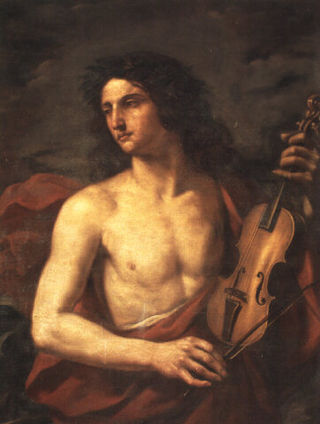
L'Orfeo, or La favola d'Orfeo, is a late Renaissance/early Baroque favola in musica, or opera, by Claudio Monteverdi, with a libretto by Alessandro Striggio. It is based on the Greek legend of Orpheus, and tells the story of his descent to Hades and his fruitless attempt to bring his dead bride Eurydice back to the living world. It was written in 1607 for a court performance during the annual Carnival at Mantua. While Jacopo Peri's Dafne is generally recognised as the first work in the opera genre, and the earliest surviving opera is Peri's Euridice, L'Orfeo is the earliest that is still regularly performed.
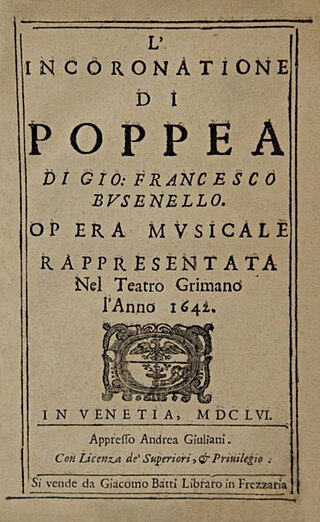
L'incoronazione di Poppea is an Italian opera by Claudio Monteverdi. It was Monteverdi's last opera, with a libretto by Giovanni Francesco Busenello, and was first performed at the Teatro Santi Giovanni e Paolo in Venice during the 1643 carnival season. One of the first operas to use historical events and people, it describes how Poppaea, mistress of the Roman emperor Nero, is able to achieve her ambition and be crowned empress. The opera was revived in Naples in 1651, but was then neglected until the rediscovery of the score in 1888, after which it became the subject of scholarly attention in the late 19th and early 20th centuries. Since the 1960s, the opera has been performed and recorded many times.

The concerto delle donne was an ensemble of professional female singers of late Renaissance music in Italy. The term usually refers to the first and most influential group in Ferrara, which existed between 1580 and 1597. Renowned for their technical and artistic virtuosity, the Ferrarese group's core members were the sopranos Laura Peverara, Livia d'Arco and Anna Guarini.
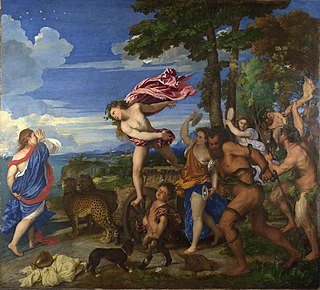
L'Arianna is the lost second opera by Italian composer Claudio Monteverdi. One of the earliest operas in general, it was composed in 1607–1608 and first performed on 28 May 1608, as part of the musical festivities for a royal wedding at the court of Duke Vincenzo Gonzaga in Mantua. All the music is lost apart from the extended recitative known as "Lamento d'Arianna". The libretto, which survives complete, was written in eight scenes by Ottavio Rinuccini, who used Ovid's Heroides and other classical sources to relate the story of Ariadne's abandonment by Theseus on the island of Naxos and her subsequent elevation as bride to the god Bacchus.

Early music of Britain and Ireland, from the earliest recorded times until the beginnings of the Baroque in the 17th century, was a diverse and rich culture, including sacred and secular music and ranging from the popular to the elite. Each of the major nations of England, Ireland, Scotland, and Wales retained unique forms of music and of instrumentation, but British music was highly influenced by continental developments, while British composers made an important contribution to many of the major movements in early music in Europe, including the polyphony of the Ars Nova and laid some of the foundations of later national and international classical music. Musicians from the British Isles also developed some distinctive forms of music, including Celtic chant, the Contenance Angloise, the rota, polyphonic votive antiphons, and the carol in the medieval era and English madrigals, lute ayres, and masques in the Renaissance era, which would lead to the development of English language opera at the height of the Baroque in the 18th century.
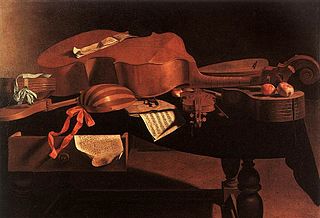
Baroque music refers to the period or dominant style of Western classical music composed from about 1600 to 1750. The Baroque style followed the Renaissance period, and was followed in turn by the Classical period after a short transition. The Baroque period is divided into three major phases: early, middle, and late. Overlapping in time, they are conventionally dated from 1580 to 1650, from 1630 to 1700, and from 1680 to 1750. Baroque music forms a major portion of the "classical music" canon, and is widely studied, performed, and listened to. The term "baroque" comes from the Portuguese word barroco, meaning "misshapen pearl". The works of Antonio Vivaldi, George Frideric Handel and Johann Sebastian Bach are considered the pinnacle of the Baroque period. Other key composers of the Baroque era include Claudio Monteverdi, Domenico Scarlatti, Alessandro Scarlatti, Alessandro Stradella, Tomaso Albinoni, Johann Pachelbel, Henry Purcell, Georg Philipp Telemann, Jean-Baptiste Lully, Jean-Philippe Rameau, Marc-Antoine Charpentier, Arcangelo Corelli, François Couperin, Johann Hermann Schein, Heinrich Schütz, Samuel Scheidt, Dieterich Buxtehude, Gaspar Sanz, José de Nebra, Antonio Soler, Carlos Seixas, Adam Jarzębski and others, with Giovanni Battista Pergolesi being the most prominent Baroque composer of sacred music.
Il rapimento di Cefalo was one of the first Italian operas. Most of the music was written by Giulio Caccini but Stefano Venturi del Nibbio, Luca Bati and Piero Strozzi also contributed. The libretto, by Gabriello Chiabrera, is in a prologue, five scenes and an epilogue and is based on the Classical myth of Cephalus and Aurora.

Baroque music of the British Isles bridged the gap between the early music of the Medieval and Renaissance periods and the development of fully fledged and formalised orchestral classical music in the second half of the eighteenth century. It was characterised by more elaborate musical ornamentation, changes in musical notation, new instrumental playing techniques and the rise of new genres such as opera. Although the term Baroque is conventionally used for European music from about 1600, its full effects were not felt in Britain until after 1660, delayed by native trends and developments in music, religious and cultural differences from many European countries and the disruption to court music caused by the Wars of the Three Kingdoms and Interregnum. Under the restored Stuart monarchy the court became once again a centre of musical patronage, but royal interest in music tended to be less significant as the seventeenth century progressed, to be revived again under the House of Hanover. The Baroque era in British music can be seen as one of an interaction of national and international trends, sometimes absorbing continental fashions and practices and sometimes attempting, as in the creation of ballad opera, to produce an indigenous tradition. However, arguably the most significant British composer of the era, George Frideric Handel, was a naturalised German, who helped integrate British and continental music and define the future of music in the United Kingdom.
Gary Alfred Tomlinson is an American musicologist and Sterling Professor of Music and Humanities at Yale University. He was formerly the Annenberg Professor in the Humanities at the University of Pennsylvania. He graduated from the University of California, Berkeley, with a Ph.D., in 1979 with thesis titled Rinuccini, Peri, Monteverdi, and the humanist heritage of opera.
Barbara Russano Hanning is an American musicologist who specializes in 16th- and 17th-century Italian music. She has also written works on the music of 18th-century France and on musical iconography.
Giulio Cesare Monteverdi (1573–1630/31) was an Italian composer and organist. He was the younger brother of Claudio Monteverdi.

Frank Anthony D'Accone was an American musicologist. He was the author of documentary studies of the musicians and institutions that produced the music of the Florentine and Siennese Renaissance. His many modern editions of the music of this culture made available to present-day performers and scholars for the first time in several centuries a wide-ranging picture of the musical life in Tuscany during the Renaissance. Musicologist Lewis Lockwood stated that his body of work "substantially extends current knowledge of the music history of the Italian Renaissance."

The Italian composer Claudio Monteverdi (1567–1643), in addition to a large output of church music and madrigals, wrote prolifically for the stage. His theatrical works were written between 1604 and 1643 and included operas, of which three—L'Orfeo (1607), Il ritorno d'Ulisse in patria (1640) and L'incoronazione di Poppea (1643)—have survived with their music and librettos intact. In the case of the other seven operas, the music has disappeared almost entirely, although some of the librettos exist. The loss of these works, written during a critical period of early opera history, has been much regretted by commentators and musicologists.

Music in early modern Scotland includes all forms of musical production in Scotland between the early sixteenth century and the mid-eighteenth century. In this period the court followed the European trend for instrumental accompaniment and playing. Scottish monarchs of the sixteenth century were patrons of religious and secular music, and some were accomplished musicians. In the sixteenth century the playing of a musical instrument and singing became an expected accomplishment of noble men and women. The departure of James VI to rule in London at the Union of Crowns in 1603, meant that the Chapel Royal, Stirling Castle largely fell into disrepair and the major source of patronage was removed from the country. Important composers of the early sixteenth century included Robert Carver and David Peebles. The Lutheranism of the early Reformation was sympathetic to the incorporation of Catholic musical traditions and vernacular songs into worship, exemplified by The Gude and Godlie Ballatis (1567). However, the Calvinism that came to dominate Scottish Protestantism led to the closure of song schools, disbanding of choirs, removal of organs and the destruction of music books and manuscripts. An emphasis was placed on the Psalms, resulting in the production of a series of Psalters and the creation of a tradition of unaccompanied singing.
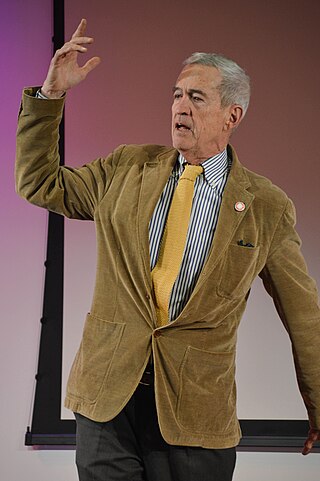
Thomas Forrest Kelly is an American musicologist, musician, and scholar. He is the Morton B. Knafel Professor of Music at Harvard University. His most recent books include: The Role of the Scroll (2019), Capturing Music: The Story of Notation (2014), and Music Then and Now (2012).

Mark Everist is a British music historian, critic and musicologist.













